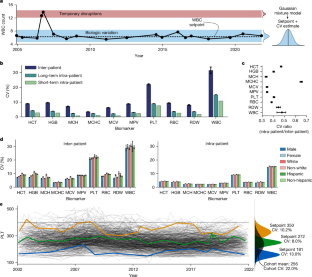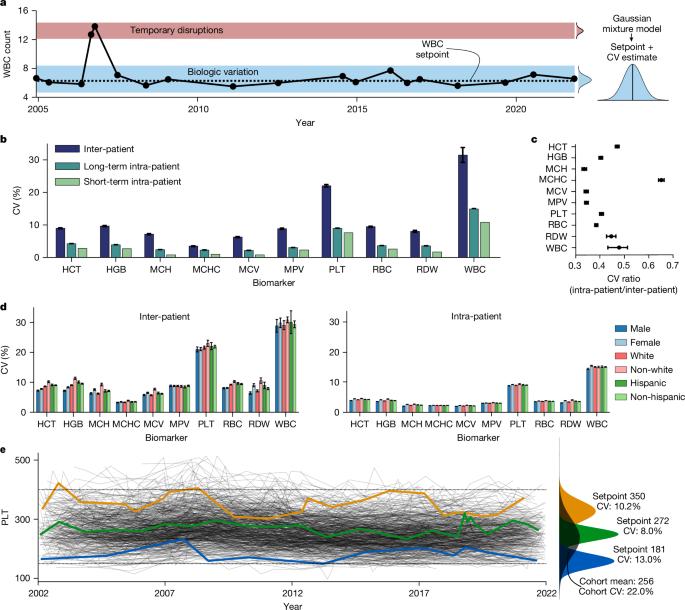血液学设定值是稳定的和患者特异性的深层表型
IF 48.5
1区 综合性期刊
Q1 MULTIDISCIPLINARY SCIENCES
引用次数: 0
摘要
全血细胞计数(CBC)是健康成人的重要筛查工具,也是定期检查中的常见检查。然而,结果通常被解释为一种适用于所有人的参考区间1,2,这破坏了精准医学的目标,即根据患者的独特特征为他们量身定制护理3,4。在这里,我们在一个学术医疗中心研究了数千名不同的患者,并表明常规CBC指数在稳定值或设定点上下波动,设定点是针对患者的,典型健康成人的9个CBC设定点与98%的其他健康成人的设定点区别开来,设定点差异至少持续20年。血液学设定点反映了一种深层的生理表型,使研究获得性和遗传决定因素的血液学调节及其在健康成人中的变化成为可能。表面健康成人的设定值与临床风险的显著变化相关:一些常见疾病和发病率的绝对风险变化超过2%(心脏病发作和中风、糖尿病、肾病、骨质疏松症),全因10年死亡率的绝对风险变化超过5%。设定值还定义了患者特定的参考区间,并个性化后续测试结果的解释。在回顾性分析中,设定值提高了一些常见疾病评估的敏感性和特异性,包括糖尿病、肾病、甲状腺功能障碍、缺铁和骨髓增生性肿瘤。这项研究表明,CBC的设定值足够稳定,并具有患者特异性,有助于实现对健康成人的精准医疗承诺。本文章由计算机程序翻译,如有差异,请以英文原文为准。


Haematological setpoints are a stable and patient-specific deep phenotype
The complete blood count (CBC) is an important screening tool for healthy adults and a common test at periodic exams. However, results are usually interpreted relative to one-size-fits-all reference intervals1,2, undermining the precision medicine goal to tailor care for patients on the basis of their unique characteristics3,4. Here we study thousands of diverse patients at an academic medical centre and show that routine CBC indices fluctuate around stable values or setpoints5, and setpoints are patient-specific, with the typical healthy adult’s nine CBC setpoints distinguishable as a group from those of 98% of other healthy adults, and setpoint differences persist for at least 20 years. Haematological setpoints reflect a deep physiologic phenotype enabling investigation of acquired and genetic determinants of haematological regulation and its variation among healthy adults. Setpoints in apparently healthy adults were associated with significant variation in clinical risk: absolute risk of some common diseases and morbidities varied by more than 2% (heart attack and stroke, diabetes, kidney disease, osteoporosis), and absolute risk of all-cause 10 year mortality varied by more than 5%. Setpoints also define patient-specific reference intervals and personalize the interpretation of subsequent test results. In retrospective analysis, setpoints improved sensitivity and specificity for evaluation of some common conditions including diabetes, kidney disease, thyroid dysfunction, iron deficiency and myeloproliferative neoplasms. This study shows CBC setpoints are sufficiently stable and patient-specific to help realize the promise of precision medicine for healthy adults. Complete blood count indices are tightly regulated around setpoints for decades in healthy adults, and represent a deep phenotype providing opportunities for investigating differential disease risks, improving clinical care and advancing precision medicine.
求助全文
通过发布文献求助,成功后即可免费获取论文全文。
去求助
来源期刊

Nature
综合性期刊-综合性期刊
CiteScore
90.00
自引率
1.20%
发文量
3652
审稿时长
3 months
期刊介绍:
Nature is a prestigious international journal that publishes peer-reviewed research in various scientific and technological fields. The selection of articles is based on criteria such as originality, importance, interdisciplinary relevance, timeliness, accessibility, elegance, and surprising conclusions. In addition to showcasing significant scientific advances, Nature delivers rapid, authoritative, insightful news, and interpretation of current and upcoming trends impacting science, scientists, and the broader public. The journal serves a dual purpose: firstly, to promptly share noteworthy scientific advances and foster discussions among scientists, and secondly, to ensure the swift dissemination of scientific results globally, emphasizing their significance for knowledge, culture, and daily life.
 求助内容:
求助内容: 应助结果提醒方式:
应助结果提醒方式:


